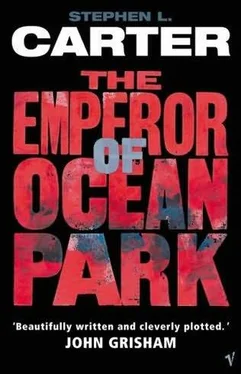Stephen Carter - Emperor of Ocean Park
Здесь есть возможность читать онлайн «Stephen Carter - Emperor of Ocean Park» весь текст электронной книги совершенно бесплатно (целиком полную версию без сокращений). В некоторых случаях можно слушать аудио, скачать через торрент в формате fb2 и присутствует краткое содержание. Жанр: Криминальный детектив, на английском языке. Описание произведения, (предисловие) а так же отзывы посетителей доступны на портале библиотеки ЛибКат.
- Название:Emperor of Ocean Park
- Автор:
- Жанр:
- Год:неизвестен
- ISBN:нет данных
- Рейтинг книги:3 / 5. Голосов: 1
-
Избранное:Добавить в избранное
- Отзывы:
-
Ваша оценка:
- 60
- 1
- 2
- 3
- 4
- 5
Emperor of Ocean Park: краткое содержание, описание и аннотация
Предлагаем к чтению аннотацию, описание, краткое содержание или предисловие (зависит от того, что написал сам автор книги «Emperor of Ocean Park»). Если вы не нашли необходимую информацию о книге — напишите в комментариях, мы постараемся отыскать её.
Emperor of Ocean Park — читать онлайн бесплатно полную книгу (весь текст) целиком
Ниже представлен текст книги, разбитый по страницам. Система сохранения места последней прочитанной страницы, позволяет с удобством читать онлайн бесплатно книгу «Emperor of Ocean Park», без необходимости каждый раз заново искать на чём Вы остановились. Поставьте закладку, и сможете в любой момент перейти на страницу, на которой закончили чтение.
Интервал:
Закладка:
“Like watching somebody in zugzwang, ” I always say, but they are not serious chess players, so they never get it. Although, being professors, they pretend to.
Searching for a distraction, I leaf through my IN box. A memorandum from the provost’s office about parking rates. An invitation to a conference on tort reform in California three months from now, but only if I pay my own way. A postcard from some fellow out in Idaho, my opponent in a postal chess tournament, who has found the one move I hoped he would miss. A reminder from Ben Montoya, the deputy dean, about some big lawyer who is speaking tonight. A moderately threatening letter from the university library about some book I have evidently lost. From the middle of the stack, I pull out the new Harvard Law Review, skim the table of contents, then drop it, fast, after coming across yet another scholarly article explaining why my infamous father is a traitor to his race, for that is the level to which the darker nation has been reduced: being unable to influence the course of a single event in white America, we waste our precious time and intellectual energy maligning each other, as though we best serve the cause of racial progress by kicking other black folks around.
All right, I have done my work for the day.
The telephone rings.
I stare at the instrument, thinking-not for the first time-what a nasty, intrusive, uncivil thing the telephone really is, demanding, irritating, interrupting, invading the mind’s space. I wonder why Alexander Graham Bell is such a hero. His invention destroyed the private realm. The device has no conscience. It rings when we are sleeping, showering, praying, arguing, reading, making love. Or when we just want desperately to be left alone. I think about not answering. I have suffered enough. And not only because my mercurial wife hung up so abruptly. This has been one of those peculiar Thursdays on which the telephone refuses to stop its angry clamor for attention: a frustrated law-review editor demanding that I dispatch an overdue draft of an article, an unhappy student seeking an appointment, American Express looking for last month’s payment, all have had their innings. The dean of the law school, Lynda Wyatt-or Dean Lynda, as she likes to be addressed by everybody, students, faculty, and alumni alike-called just before lunch to assign me to yet another of the ad hoc committees she is always creating. “I only ask because I love you,” she crooned in her motherly way, which is what she says to everybody she dislikes.
The phone keeps ringing. I wait for the voice mail to answer, but the voice mail, like most of the university’s cut-rate technology, operates best when not needed. I decide to ignore it, but then I remember that my conversation with Kimmer ended badly, so perhaps she is calling to make up.
Or to argue some more.
Bracing myself for either alternative, I snatch up the handset, hoping for the voice of my possibly repentant wife, but it is only the great Mallory Corcoran, my father’s law partner and last remaining friend, as well as a Washington fixer of some repute, calling to tell me that the Judge is gone.
CHAPTER 2
I arrive in Washington on Friday afternoon, the day after my father’s death, leave my bags at the home of Miles and Vera Madison, my wife’s diffident and proper parents, then go over to the Shepard Street house, only to find that Mariah, in her orderly way, has done most of what needs doing. (By unspoken agreement, we both know the family cannot rely on flighty Addison, who has yet to relay any travel plans.) Long ago, Mariah was a plump, disorderly child, with a terrible inferiority complex about her younger, fair-skinned sister, for an obsession with pigmentation is even now the curse of our race, especially in families like mine. As she grew older, Mariah became a stately, almost regal, beauty, somehow ignored nevertheless by the men of the Gold Coast (as we style our narrow, upper-middle-class strip of the darker nation), perhaps running now to fleshiness, but that is to be expected after bearing five children, according to sour Kimmer, professional lawyer and amateur fitness guru. (Kimmer has borne exactly one, a half-planned accident we named Bentley after his maternal grandmother’s maiden name.) The adult Mariah is also fabulously well organized, the only one of the children who takes after the Judge in that respect, and she does not believe in rest. But moments after I walk through the door of the rambling and ugly Shepard Street house where we both spent our teen years, Mariah dumps the rest of the work on me. She does this, I think, not out of grief or malice or even exhaustion, but out of the same trait that led her to quit journalism for a career of raising her children, a peculiar willed deference to men, inherited from our mother, who required of her two daughters less that they play a role than that they display an attitude: there were tasks unfit for their gender. Kimmer hates this in my sister, and has accused her, once to her face, of wasting the brain that earned her Phi Beta Kappa in her junior year at Stanford. Kimmer tossed out this line at a Christmas party in this very house that we foolishly attended two years ago. Mariah, smiling, responded calmly that her children deserve the best years of her life. Kimmer, who scarcely broke her professional stride when Bentley was born, took this as a personal attack and said so, which gave my sister and me another reason, if one was needed, not to speak to each other.
You should understand that in many ways I love and respect my sister. When we were younger, Mariah was, by common agreement, the most intellectually able of my parents’ four children, and the one most earnestly and touchingly devoted to the impossible work of gaining their approval. Her successes in high school and college warmed my father’s heart. To warm my mother’s, Mariah married once and happily, an earlier fiance who would have been a disaster having conveniently absconded with her best friend, and she produced grandchildren with a regularity and an enthusiasm that delighted my parents. Her husband is white and boring, an investment banker ten years her senior whom she met, she told the family, on a blind date, although sweet Kimmer always insists that it could only have been the personals. And, if I admit the truth, Mariah has always preferred white men, all the way back to her high-school years at Sidwell Friends, when, under the hawklike scrutiny of our brooding father, she began to date.
At Shepard Street, Mariah is greeting callers in the foyer, formal and sober in a midnight blue dress and a single strand of pearls, very much the lady of the house, as my mother might have said. From somewhere in the house wafts my father’s terrible taste in classical music: Puccini with an English-language libretto. The foyer is small and murky and crowded with mismatched pieces of heavy wooden furniture. It opens on the left to the living room, on the right to the dining room, and in the back to a hallway leading to family room and kitchen. A broad but undistinguished staircase strides upward next to the dining-room door, and along the upstairs hall is a gallery where I used to crouch in order to spy on my parents’ dinner parties and poker games, and where Addison once made me hide in a successful effort to prove to me that there is no Santa Claus. Beyond the gallery is the cavernous study where my father died. To my surprise, I see two or three people up there now, leaning on the banister as though it belongs to them. In fact, there are more people in the house than I expect. The entire first floor seems filled with somber suits, a larger slice of financially comfortable African America than most white Americans probably think exists outside the sports and entertainment worlds, and I wonder how many of the guests are happier about my father’s death than their faces attest.
Читать дальшеИнтервал:
Закладка:
Похожие книги на «Emperor of Ocean Park»
Представляем Вашему вниманию похожие книги на «Emperor of Ocean Park» списком для выбора. Мы отобрали схожую по названию и смыслу литературу в надежде предоставить читателям больше вариантов отыскать новые, интересные, ещё непрочитанные произведения.
Обсуждение, отзывы о книге «Emperor of Ocean Park» и просто собственные мнения читателей. Оставьте ваши комментарии, напишите, что Вы думаете о произведении, его смысле или главных героях. Укажите что конкретно понравилось, а что нет, и почему Вы так считаете.












